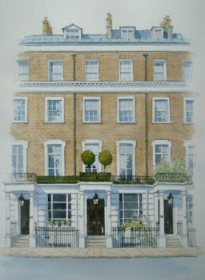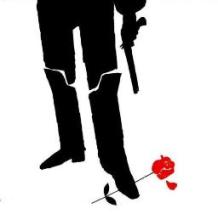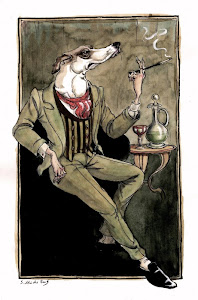
30 April 2013
29 April 2013
26 April 2013
23 April 2013
18 April 2013
16 April 2013
A Son Of Crusaders And Privateers
 “The family of Ungern von Sternberg is an old family, a mixture of Germans with Hungarians—Huns from the time of Attila. My warlike ancestors took part in all the European struggles. They participated in the Crusades and one Ungern was killed under the walls of Jerusalem, fighting under Richard Coeur de Lion. Even the tragic Crusade of the Children was marked by the death of Ralph Ungern, eleven years old. When the boldest warriors of the country were despatched to the eastern border of the German Empire against the Slavs in the twelfth century, my ancestor Arthur was among them, Baron Halsa Ungern Sternberg. Here these border knights formed the order of Monk Knights or Teutons, which with fire and sword spread Christianity among the pagan Lithuanians, Esthonians, Latvians and Slavs. Since then the Teuton Order of Knights has always had among its members representatives of our family. When the Teuton Order perished in the Grunwald under the swords of the Polish and Lithuanian troops, two Barons Ungern von Sternberg were killed there. Our family was warlike and given to mysticism and asceticism.
“The family of Ungern von Sternberg is an old family, a mixture of Germans with Hungarians—Huns from the time of Attila. My warlike ancestors took part in all the European struggles. They participated in the Crusades and one Ungern was killed under the walls of Jerusalem, fighting under Richard Coeur de Lion. Even the tragic Crusade of the Children was marked by the death of Ralph Ungern, eleven years old. When the boldest warriors of the country were despatched to the eastern border of the German Empire against the Slavs in the twelfth century, my ancestor Arthur was among them, Baron Halsa Ungern Sternberg. Here these border knights formed the order of Monk Knights or Teutons, which with fire and sword spread Christianity among the pagan Lithuanians, Esthonians, Latvians and Slavs. Since then the Teuton Order of Knights has always had among its members representatives of our family. When the Teuton Order perished in the Grunwald under the swords of the Polish and Lithuanian troops, two Barons Ungern von Sternberg were killed there. Our family was warlike and given to mysticism and asceticism. During the sixteenth and seventeenth centuries several Barons von Ungern had their castles in the lands of Latvia and Esthonia. Many legends and tales lived after them. Heinrich Ungern von Sternberg, called ‘Ax,’ was a wandering knight. The tournaments of France, England, Spain and Italy knew his name and lance, which filled the hearts of his opponents with fear. He fell at Cadiz ‘neath the sword of a knight who cleft both his helmet and his skull. Baron Ralph Ungern was a brigand knight between Riga and Reval. Baron Peter Ungern had his castle on the island of Dago in the Baltic Sea, where as a privateer he ruled the merchantmen of his day.
In the beginning of the eighteenth century there was also a well-known Baron Wilhelm Ungern, who was referred to as the ‘brother of Satan’ because he was an alchemist. My grandfather was a privateer in the Indian Ocean, taking his tribute from the English traders whose warships could not catch him for several years. At last he was captured and handed to the Russian Consul, who transported him to Russia where he was sentenced to deportation to the Transbaikal. I am also a naval officer but the Russo-Japanese War forced me to leave my regular profession to join and fight with the Zabaikal Cossacks. I have spent all my life in war or in the study and learning of Buddhism. My grandfather brought Buddhism to us from India and my father and I accepted and professed it. In Transbaikalia I tried to form the order of Military Buddhists for an uncompromising fight against the depravity of revolution.”
Ferdinand Ossendowski, Beasts, Men, and Gods (1922)
15 April 2013
13 April 2013
10 April 2013
09 April 2013
08 April 2013
On Thatcher
A few words in remembrance of Margaret Thatcher (1925-2013). For two summers between school and university I worked for the Conservative Party in London--at the constituency office level, at Conservative Central Office, and at Parliament for a Tory MP. I met her on several occasions in the last days of her reign. Always proper, always polite. Knowing my admiration, a girlfriend at the time who worked for an opposition politician gave to me as souvenirs several signed pieces of correspondence from her. At the time I very much appreciated the economic logic of Thatcherism. My views in those days were conservative-libertarian, pro-free market. And yet, I had doubts. I failed to understand exactly how on a societal and cultural level City 'barrow boys' were an improvement over Durham miners or Lancashire farmers. The Thatcher revolution, as it was called, struck me as a deeply American project, and, as such, alien to England. Even more crucially, I began to sense that ignoring the biological and demographic realities of the struggle ultimately would doom the conservative movement both in England and the US. A decade later my instincts were proved right when I once again settled in London and saw a city transformed by what can only be described as ethnic cleansing and race-replacement, i.e. genocide, changes that propelled me to the hardcore Nationalist side. It has been heart-breaking. The Thatcherism of my youth I attribute to naïveté; I have no other excuse. But there was an element of conviction and enthusiasm for the fight amongst Tory true-believers that with a few exceptions is lacking today. For having been exposed to it I am grateful. Thatcher, for all her imperfections, was a genuine statesman. There is much more I can say about my time with the Conservatives--and I will later--but I am afraid it will come across to you as so much reminiscing, sexual bravado, and gossip. Years move on.
Labels:
Admiral Cod
04 April 2013
02 April 2013
Subscribe to:
Comments (Atom)





































